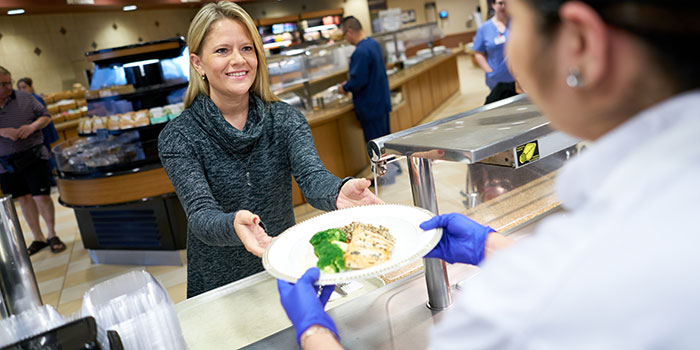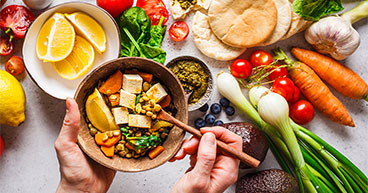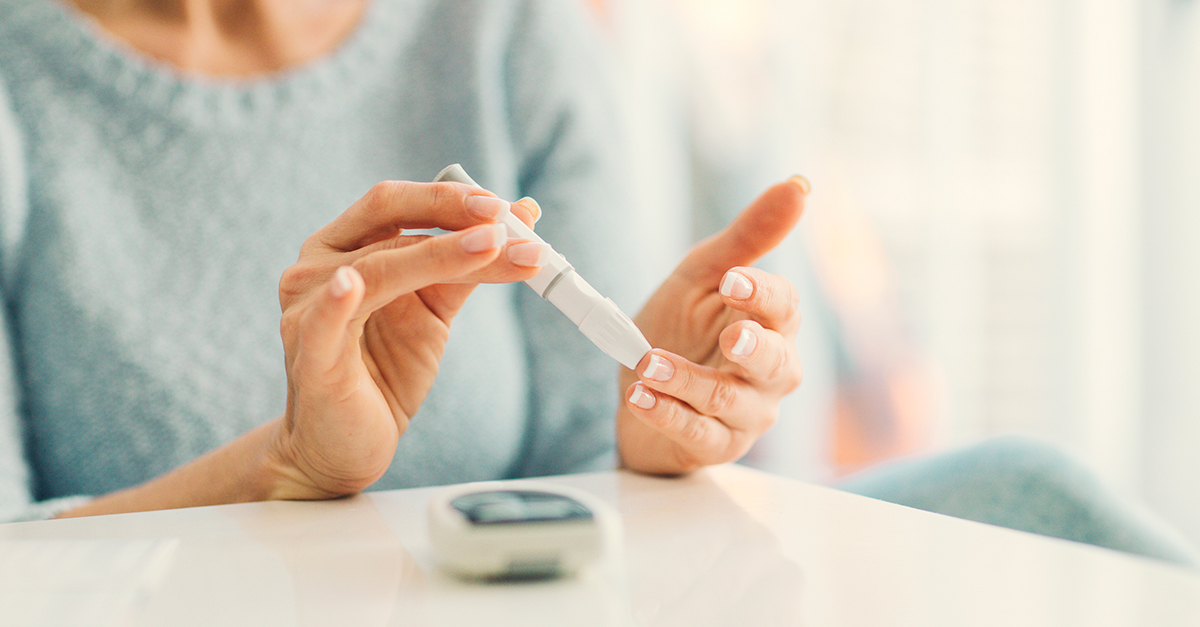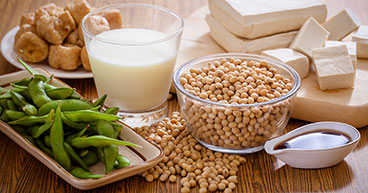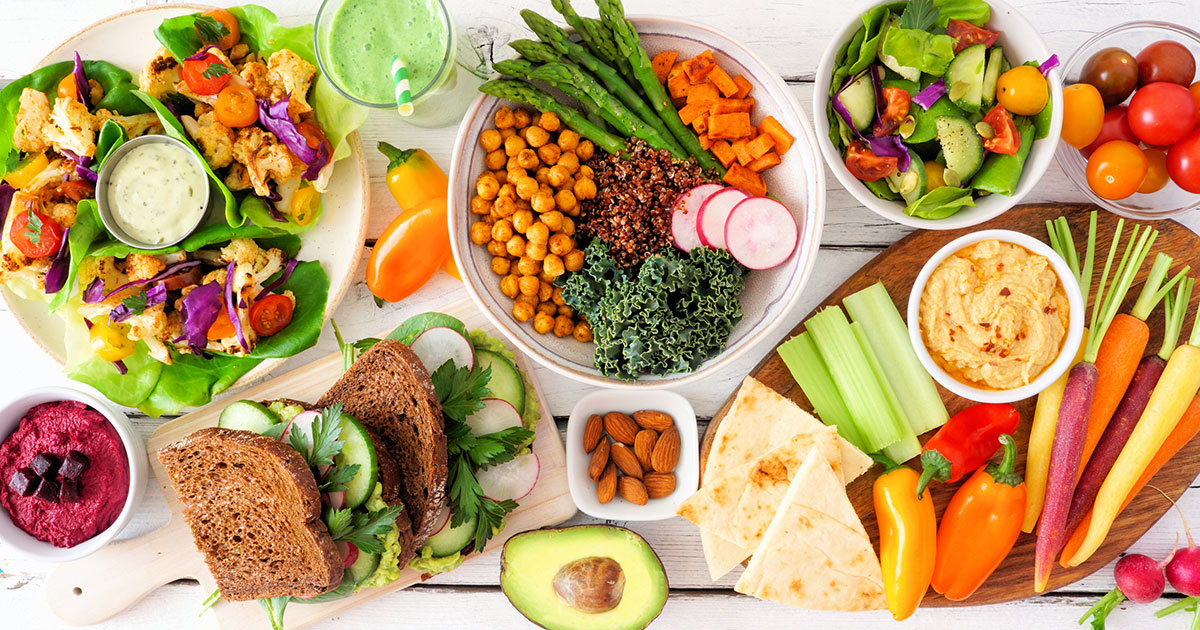
Eating a healthy diet has so many proven benefits, from losing weight to helping build strong muscle and bones. And it gives the body more of the nutrients it needs—which in turn may help cancer patients better manage treatment-related side effects and help them stay strong during their recovery.
Plant-based diets may provide a healthier alternative to the Standard American Diet (SAD), or Western diet, a high-calorie feast loaded with red meat, high-fat dairy products, heavily processed foods, fast foods, refined carbohydrates, added sugars and salt.
The American Institute for Cancer Research (AICR) now promotes the New American Plate, which instead focuses on eating sensible servings of a variety of whole foods—vegetables, fruits, whole grains and beans—that are high in nutritional value and low in calories.
“If you’re eating the SAD diet, where you’ve got a big piece of meat and you might have one broccoli floret, it’s flipping that, so that meals are planned around whole grains, vegetables and beans,” says Carolyn Lammersfeld, Vice President of Integrative Care at Cancer Treatment Centers of America® (CTCA). “Meat, if you have animal foods, are more of a complement.”
Healthy plant-based diets vary from strict vegetarian or vegan to those considered “plant forward,” Lammersfeld says. The latter, including the New American Plate and the Mediterranean Diet, emphasizes plant-based foods but may include small amounts of meat or other animal-based food products.
Some studies have suggested that eating whole soy foods, such as tofu, edamame and soy milk, may reduce the risk of breast cancer and prostate cancer. But these conclusions are largely based on observational studies rather than rigorous clinical trials.
“It’s hard to do that type of research. There are individual food components, where if you look at them in more of a laboratory-type study and isolate them, they may show anti-cancer activity or activity at the cellular level that would be considered preventive,” Lammersfeld says. “However, that’s not how the human body works. We’re constantly putting a combination of things into our body. We’re exposed to things in the environment, in our genetics and in our gut microbiomes. What happens in a lab test—or even in an animal, for that matter—isn’t necessarily what’s going to happen in individual human bodies.”
Some of the topics covered in this article include:
- Dieting: Lifestyle choice or medical necessity?
- The vegetarian-vegan alternative
- A plant-meat balance
- Nutritional support at CTCA®
If you’ve been diagnosed with cancer and are interested in a second opinion about your diagnosis or treatment plan, call us or chat online with a member of our team.
Dieting: Lifestyle choice or medical necessity?
A diet can be a lifestyle choice, Lammersfeld says, but for cancer patients, it may also be a medical necessity similar to that for diabetics, who have to consume a consistent amount of carbohydrates meal to meal, day to day, or risk blood-sugar spikes.
“If we have a patient who has a history of bowel obstructions, or partial bowel obstructions because of the type of cancer, it can cause nausea and vomiting, and it’s a dangerous situation. In that case, a diet wouldn’t be a lifestyle choice,” she says. “They would have to follow a low-fiber or a low-residue diet to try to reduce the risk of that bowel closing off.”
The same goes for some thyroid cancer patients, whose treatment after surgery include radioactive iodine to help kill remaining cancer cells. “They may have to follow a low-iodine diet for a week or two before that treatment to try to help it work better,” Lammersfeld says.

The vegetarian-vegan alternative
Research has shown dietary choices do have definitive health benefits. Avoiding processed meat, for instance, considered one way to lower cancer risk, may also reduce the risk of heart disease.
Both vegetarian and vegan diets are meat-free and rely heavily on plant-based sources of nutrition such as whole grains, fruits, vegetables and beans—including soy. While a vegan diet excludes animal products, including honey, a vegetarian diet may include honey and dairy items such as milk, eggs and cheese.
But that doesn’t mean those diets are healthy.
“I’ve seen people eat a less-than-healthy vegetarian diet,” Lammersfeld says. “It doesn’t make it a healthy diet if you end up replacing meat with a lot of high-fat cheeses or you’re adding a lot of fats.”
When you leave meat off your plate, you need to make up for the lost nutrients with plenty of fruits and veggies. “For protein, ideally, it’s really making sure you replace the meat meals with more plant-based proteins, which we usually think of as legumes—dried peas, beans, lentils—and having a good amount of them on a regular basis,” Lammersfeld says.
For cancer patients, other factors may need to be taken into consideration, such as the potential for roughage to cause digestive issues as a result of colon cancer or its treatment.
“There are times when patients, either because of the type of cancer they have or the treatments they’re undergoing, may need a lower-fiber approach—or a lower-fiber approach for a period of time,” Lammersfeld says. “They may have to balance out how many beans, if any, they can eat or tolerate, or they may need to liberalize the diet a little bit and maybe incorporate some fish or poultry, if they’re willing to.”
Those on a vegan diet may have to overcome additional challenges to make sure they’re eating nutritiously.
“Some people may follow a vegan diet for religious or cultural reasons. Then we work to make sure they can do it and get what they need, so that they have adequate nutrients during and after treatment,” Lammersfeld says. “We may work with them to use a vegan source of protein, like a protein powder, if they need additional protein. Vitamin B-12 is something that’s pretty hard to get on a vegan diet, so we want to make sure they’re consuming foods enriched with B-12, or that they’re taking a supplement that has B-12.”
The same goes for iron and vitamin D, she says: “Calcium, with a vegan diet, requires a little bit more planning to make sure you’re getting everything you need. Omega-3 fatty acids are something that can be helpful for your general health and may have a role during cancer treatment, and they’re pretty hard to get on a vegan diet.”
A plant-meat balance
If patients don’t have specific reasons for eating a vegetarian or vegan diet, a less-restrictive plant-based diet is generally recommended.
“You don’t have to go strict vegetarian or strict vegan,” Lammersfeld says. “If two-thirds of your plate is full of plant foods—whole grains, fruits, vegetables, beans—you can have a third of your plate filled with some animal protein, with fish or chicken or small portions of lean meats, ideally unprocessed ones.”
The AICR and American Cancer Society recommend plant-forward diets that have less red meat, fewer added sugars and fewer processed foods than the typical American eats today. Some aspects to these diets may lower cancer risk.
“Some of that is because plant-based foods have more fiber, vitamins, minerals, phytochemicals—lots of nutrients that could potentially keep cells healthy and decrease the risk of the type of DNA damage to cells that can become a problem,” Lammersfeld says.
“Some of it is also because those types of eating patterns tend to make it easier for people to achieve and attain a healthy body weight, and we do know that carrying extra weight or having obesity increases the risk of 13 cancers.”
Evidence suggests a healthy diet may reduce the risk of dying from cancer, while “an unhealthy Western dietary pattern is positively associated with risk of overall mortality among cancer survivors,” according to a 2016 review and analysis of dietary influences on cancer.
Nutritional support at CTCA
At CTCA, patients receive nutritional support from registered, oncology-trained dietitians, helping them maintain their body weight and strength, while addressing nutrition-related deficiencies and dealing with diet-related symptoms they may experience.
Some cancer patients may experience gastrointestinal problems, nausea or other symptoms that may affect their ability or desire to eat. Nutritional support is used to help patients manage these symptoms and maintain their strength and nutritional balance during treatment. At CTCA, depending on their need, patients may meet with a registered dietitian to address nutrition-related deficiencies. A dietitian, trained and educated in nutritional care, evaluates the patient’s nutritional status and makes recommendations for staying nourished with healthy foods and a well-balanced diet.
Nutritional support may be used to manage these side effects:
- Digestive issues
- Dry mouth
- Eating difficulties
- Fatigue
- Loss of appetite
- Malnutrition
- Mucositis and mouth sores
- Nausea and vomiting
- Taste and smell changes
- Weight loss
Lammersfeld says she urges cancer patients to take advantage of the nutritional support services available to them.
“No matter where you receive your cancer treatment, it’s important to work with a nutritional support team,” she says. “They are trained and experienced in working with cancer patients, who have very specific nutritional needs.”
If you’ve been diagnosed with cancer and are interested in a second opinion about your diagnosis or treatment plan, call us or chat online with a member of our team.

